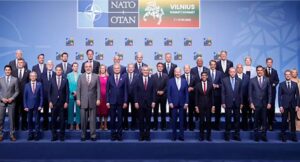Matt Broomfield
This week brought the strongest declaration yet of United States opposition to Turkey’s mooted ground invasion of Kurdish-led North and East Syria (NES). In a call with his Turkish counterpart Hulusi Akar, US Secretary of Defense Lloyd J. Austin III shared his Department’s “strong opposition to a new Turkish military operation in Syria.”
Very well. Albeit that Austin couched his criticism in the both-sidesim typical of all international policy positions vis-a-vis Turkey’s repeated wars against the Kurds and their allies, the US has at least made its position clear. Turkish airstrikes landing close enough to US positions in NES to force the evacuation of non-military personnel have reminded the Pentagon once again of Turkey’s profound unreliability as a security partner.
But the US’ stated opposition alone will not be enough. In a column for Foreign Policy, commentator Steven A. Cook reminded readers that Turkish President Erdoğan and his associates are quite happy to antagonize their nominal NATO partners. They expect and receive a muted response from Washington, where a monomaniacal focus on the Russian threat means many policy-makers turn a blind eye to the erratic, autocratic course steered by Erdoğan.

As the Kurdish Peace Institute’s Meghan Bodette argued at a recent Medya News event, the USA has typically issued only warnings before Turkish invasions, following up with concrete sanctions only once the tanks have rolled in, the jihadist militias have been deployed, and the local political and civil fabric is already and irrevocably torn apart. This approach will not suffice to prevent Erdoğan from moving fast and unilaterally to seize swathes of Syrian territory, score a cheap domestic political victory, and demonstrate to the world his ability to act with impunity even against the interests of his professed allies.
For Erdoğan needs the Kurds – or, more precisely, needs a perpetual war against their democratic political project to distract voters from domestic economic woes and increasing securitization which has decimated both civil society and legitimate political opposition in the country. What is less often recalled is that Erdoğan also benefits from his love-hate relationship with the US political administration.

“The very fact that the United States has been coordinating with the [Syrian Kurdish] YPG for almost a decade [in the fight against ISIS] provides Erdogan additional incentive and opportunity to leverage the violence for political gains,” commentator Stephen A. Cook argued in a recent column for Foreign Policy. “There is a vast reservoir of anti-Americanism in Turkey that runs deep… The current trainwreck in bilateral relations actually serves everyone’s interests.”
On the one hand, Erdoğan can pose as a strongman, using US equivocation over the Kurdish issue to demand other concessions from the West. On the other, the USA knows it can treat the Syrian Kurdish political movement as it sees fit – for example by allowing them to suffer for years under the same sanctions as the Syrian regime to which they constitute the only valid democratic opposition, or by bowing to Turkish pressure and refusing to allow a single representative of the millions-strong multiethnic region to participate in the official negotiations over the future for Syria.
Thus we reach the current crisis. The US will never really stand up to Erdoğan, and no matter what reforms might be put in place or steps taken to placate Ankara, the Turkish government will always find fresh excuses to assault the Kurdish political movement and its legitimate representatives. And even if the US are able to dissuade Erdoğan from an assault in their zone of influence, no matter – he will be permitted to conduct so many airstrikes against Kurdish and allied political leaders, military commanders in the fight against ISIS and civil society representatives as to effectively continue the war by other means.

All the while, of course, he retains the option of reaching a quid pro quo with Moscow and pursuing military objectives in the Russian sphere of influence, as seems to be his current plan. With Putin increasingly in need of friends on the international stage, Erdoğan may well finally be able to reach the deal he has been seeking for years.
If not today, then some day soon: if not against North and East Syria, then against the Kurdish movement elsewhere. Erdoğan is not worried by international condemnation, or overly scared of losing favour in the West given his carefully-crafted role as a mediator in the Ukraine war. He will only understand the language of pre-emptive sanctions, exclusion from international military hardware programmes, and a clear message that the cost of war will this time be too much for him bear.
- Matt Broomfield is a freelance journalist, poet and activist. He writes for VICE, Medya News, the New Statesman and the New Arab; his prose has been published by The Mays, Anti-Heroin Chic and Plenitude; and his poetry by the National Poetry Society, the Independent, and Bare Fiction. His work was displayed across London by Poetry on the Underground, and he is a Foyle Young Poet of the Year.










